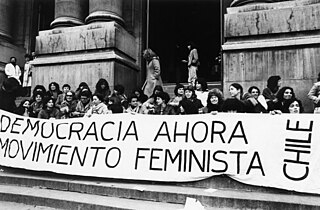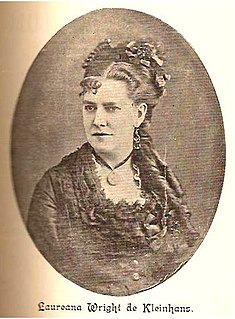
The Female Peronist Party was an Argentine political party created in 1949 and disappeared in 1955. The party only accepted women and was founded by Eva Perón, who was also the first president of the party.

Women in Paraguay is a group of women whose rights are challenged in the country of Paraguay. Faced by socioeconomic inequalities and gender pay gap, they experienced significant cultural changes since 1990 as a result of constitutional and legal expansions of women's rights and evolving cultural attitudes. The legal and government institutions currently existing in Paraguay were developed in part through the efforts of feminist organizations in the country that held significant awareness-raising campaigns during the 1990s to formalize the guarantees of women's rights. UN Women supports the Paraguayan State in the challenge to extend women's rights, to fight for gender equality, as well as women's empowerment. It also ensures that women's voices are heard and create more opportunities for women.

Feminism in Chile has its own liberation language and activist strategies for rights that is shaped by the political, economic, and social system of Chile. Beginning in the 19th century, Chilean women have been organizing with aspirations of asserting their political rights. These aspirations have had to work against the reality that Chile is one of the most socially conservative countries in Latin America. The Círculo de Estudios de la Mujer is one example of a pioneering women's organization during the Pinochet dictatorship (1973–1989) which redefined women's responsibilities and rights, linking “mothers’ rights” to women's rights and women's civil liberties. The founding members of the Círculo de Estudios de La Mujer consisted of a small group of Santiago feminists who were from the Academia de Humanismo Cristiano. These women gathered "to discuss the situation of women in Chile," their first meeting drew a crowd of over 300 participants and from there challenged the authoritarian life in Santiago. These women helped shape the rights for women in Chile.
Mercedes Sandoval de Hempel was a Paraguayan lawyer and feminist. She was one of the leading proponents of women's suffrage in the country, drafting the Anteproyecto de Ley de Reforma Parcial del Código Civil. In 1992, the amendment of the Paraguayan Civil Code finally recognized equality between men and women. The wording of Article 1 of Law 704/61 was simple: “Reconócese a la mujer los mismos derechos y obligaciones políticos que al hombre.”

Laureana Wright de Kleinhans (1846-1896) was a Mexican writer and feminist pioneer. Her writings on the role of women, were revolutionary for her time. Her magazine, Violets of Anahuac in 1887, changed the paradigm by promoting as the core ideology of the magazine, the feminine ideal of a cultured, educated wife and mother. The publication promoted female education and insisted that the intellectual equality between men and women was the means of emancipation. She was one of the first feminist theorists in Mexico, asking women to question their role in society and the conditions in which they lived. She covered topics such as education, women's suffrage and legal equality between men and women. She wrote patriotic poetry and served as the vice president of the Spiritualist Society of Mexico, which she joined because one of its principles held that men and women were of equal intelligence.
The Primer Congreso Interamericano de Mujeres was a feminist meeting held from 21 to 27 August 1947 in Guatemala City, Guatemala. It was called together by the Women's International League for Peace and Freedom (WILPF) and hosted by the Unión Democrática de Mujeres of Guatemala. This organization had been formed by Angelina Acuña de Castañeda, Berta Corleto, Elisa Hall de Asturias, Gloria Menéndez Mina de Padilla, Rosa de Mora, Irene de Peyré, and Graciela Quan immediately following the Guatemalan 1944 coup d'état to push for recognition of women's civil rights.
Graciela Quan Valenzuela was a Guatemalan lawyer and activist. She campaigned for women's suffrage, writing a draft proposal for Guatemala's enfranchisement law. She was also a social worker, adviser to the President of Guatemala, delegate to the United Nations and the President of the Inter-American Commission of Women.
Pilar Jorge de Tella was a leading Cuban suffragist, active in the 1920s. She was one of the founders of the Feminine Club of Cuba and later organized the National Feminist Alliance. She presented petitions to the legislature and constitutional conventions demanding suffrage. Once suffrage was obtained, as an anti-communist, she left the political arena.
Aída Peláez Martínez, also known by her pseudonym Eugenio, was a Cuban writer, journalist, suffragist, and feminist activist. She was one of the architects of Cuba's women's suffrage campaign of the 1910s, along with Digna Collazo and Amalia Mallén. To this end, she participated in various pro-feminist organizations.

María Collado Romero was a Cuban journalist, poet, and feminist. She was the first female news reporter and parliamentary reporter in Cuba. She was the creator and president of the Democratic Suffragist Party of Cuba.
Pro-Emancipation Movement of Chilean Women was both a historic women's rights organization, which pressed for equality between 1935 and 1953 and a current umbrella organization reorganized in 1983 to organize other women's organizations to provide unity in the struggle for the country to return to democracy. Once the dictatorship was overturned the NGO turned their focus to uniting organizations which pursue a broad spectrum of issues pertaining to women's rights and development.
Feminists were involved in the Spanish Civil War, although the conditions underlying their involvement pre-dated the Second Republic.
Women's suffrage in the Spanish Second Republic period was the result of efforts dating back to the mid-1800s. Women and men working towards universal suffrage had to combat earlier feminist goals that prioritized social goals, including access to education, political rights such as a woman's right to vote and equal wages. As a middle class developed and women gained more access to education, they began to focus more on the issue of suffrage but this was often around specific ideological philosophies; it was not tied into a broader working class movement calling for women's emancipation.
Women in the Confederación Nacional del Trabajo in the Spanish Civil War period faced many specific challenges owing to a long history of sex-based discrimination in the Spanish anarcho-syndalicalism movement and in the Confederación Nacional del Trabajo (CNT). From early in its history, there was a belief that a woman's primary role was to reproduce and that only men should be in the workforce. Few women were involved in the early efforts inside Spain, and internationally there were active attempts to keep women out. The formal creation of the CNT in 1910 did little to change this. Anarchist men inside the CNT actively tried to keep women out to avoid diminishing their own importance.
Women in the Spanish Socialist Workers' Party in the Spanish Civil War were few in number, mainly as a result of the Spanish Socialist Workers' Party (PSOE)'s resistance to women's rights. The party had opposed the women's rights movement, seeing it as a bourgeois endeavor that interfered with their ability to work for labor rights. Despite warnings from prominent women about the problems related to this position, they re-affirmed it several times in the period prior to the Dictatorship of Primo de Rivera.

Benita Asas Manterola was a Spanish teacher, journalist, and suffragist.

Gloria Menéndez Mina was a Guatemalan writer and women's rights activist who was involved in the women's suffrage movement in Guatemala. One of the first women to participate in journalism in the country, she directed the magazines Mujer and Azul. In her later career, she served as a press attaché in Mexico and was known for her book, Francisco Javier Mina, héroe de México y España.
Women's suffrage in Chile was introduced on the communal level in 1935, and on national level on 8 January 1949. It was the product of a long period of activism, tracing back to 1877, when women were allowed to attend university, a reform which stimulated the formation of a women's movement. The women's suffrage was a reform which was actively promoted since the 1920s by the organizations Comité Nacional pro Derechos de la Mujer, Pro-Emancipation Movement of Chilean Women and Federación Chilena de Instituciones Femeninas (FECHIF).
Atene Femenino was a women's organization in Bolivia, founded in 1923. It has been referred to as the first women's organization in Bolivia.

The First Feminist Congress of Yucatán was a gathering of Mexican feminists that happened in 1916. The delegates gathered at the José Peón Contreras Theater in Mérida, Yucatán, Mexico from January 13 to 16. It was held under the auspices of the Yucatecan government. The Mexican government and historians largely consider it the first of its kind in the country. It was the second to be held in all of Latin America and the Caribbean, the first held in Argentina in 1910.







